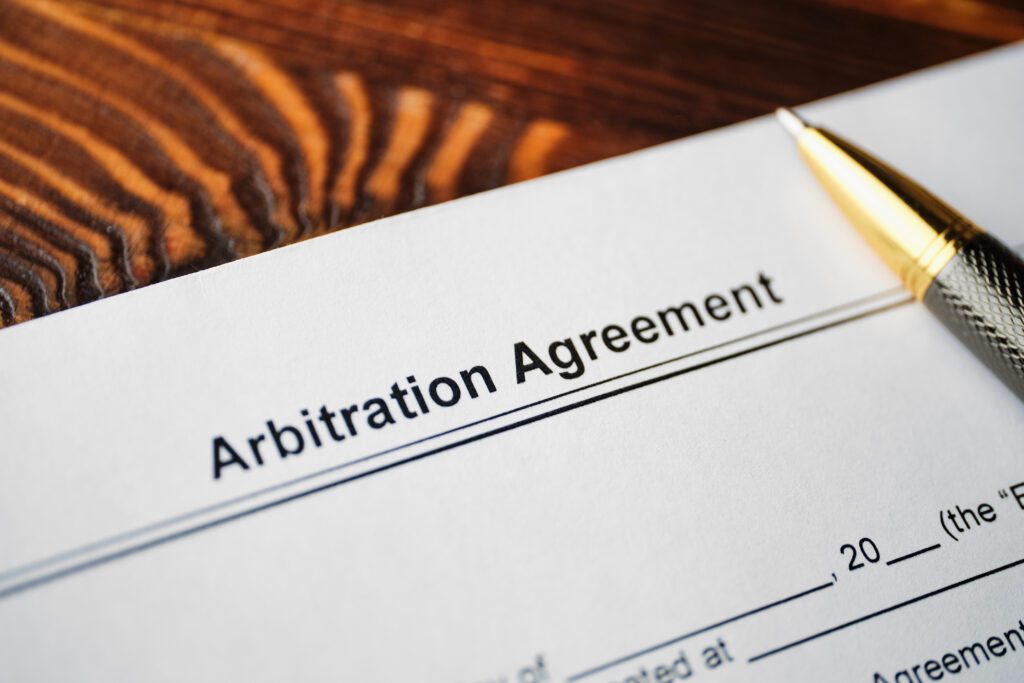BRIAN J GRABER LLC is a sexual harassment lawyer representing employees in sexual harassment claims against their employers in Illinois, Indiana, and Michigan. Effective March 3, 2022, the Federal Arbitration Act was amended prohibiting mandatory arbitration of sexual assault and harassment claims. The amendment to the Federal Arbitration Act prevents employers from enforcing mandatory arbitration agreements requiring employees who are victims of sexual assault and harassment to arbitrate their claims for workplace sexual harassment.
In Gilmer v. Interstate/Johnson Lane Corp., 500 U.S. 20, 26 (1991) the Supreme Court held statutory claims for age discrimination under the ADEA may be the subject of an arbitration agreement, enforceable through the Federal Arbitration Act. Since Gilmer, employers began slipping mandatory arbitration agreements into pre-employment paperwork to deprive employees of pursuing their rights under State and Federal employment laws in court.
These mandatory arbitration agreements can be legally enforceable. These arbitration agreements bar employees from going to court and receiving a jury trial on whether or not their employer violated their rights under State and Federal employment laws. Instead, the employee is forced to litigate their employment rights under State and Federal employment laws through a private arbitration process spelled out in the mandatory arbitration agreement. These mandatory arbitration agreements that are forced on employees generally favor the employer.

Despite the fact that there is often unequal bargaining power between an employer and an employee the Supreme Court has held that this is not sufficient enough a reason to hold arbitration agreements are never enforceable in the employment context holding as follows:
An additional reason advanced by Glimer for refusing to enforce arbitration agreements relating to the ADEA claims is his contention that there is often will be unequal baraganing power between employers and employees. Mere inequality bargaining power, however, is not a sufficient reason to hold that arbitration agreements are never enforceable in the employment context.
Gilmer v. Interstate/Johnson Lane Corp., 500 U.S. 20, 32-33 (1991).
Enforcement of mandatory arbitration agreements serves as a barrier to justice for employees who are subject to sexual assault or harassment in the workplace. Congress needs to go further and ban the use of mandatory arbitration agreements in all employment-related disputes.
Federal Arbitration Act Definitions.
The Federal Arbitration Act, 9 U.S.C. 401 defines the following terms:
- Predispute Arbitration Agreement – means any agreement to arbitrate a dispute that had not arisen at the time of the making of the agreement.
- Predispute Joint-Action Waiver – means an agreement, whether or not part of a predispute arbitration agreement, that would prohibit, or waive the right of, one or more parties to the agreement to participate in a joint, class, or collective action in a judicial, arbitral, administrative, or other forum, concerning a dispute that has not yet arisen at the time of the making of the agreement.
- Sexual Assault Dispute – means a dispute involving the nonconsensual sexual act or sexual conduct, as such terms are defined in 18 U.S.C. 2246 or similar applicable tribal or State law, including when the victim lacks capacity to consent.
- Sexual Harassment Dispute – means a dispute relating to conduct that is alleged to constitute sexual harassment under Federal, Tribal, or State law.
Mandatory Arbitration Agreements Requiring Employees Covering Sexual Assault and Harassment Claims Have No Validity Or Enforceability.
The amendment to the Federal Arbitration Act allows victims of workplace sexual assault and sexual harassment claims to elect to arbitrate their claims under any predispute arbitration agreement or any predispute joint-action waiver or litigate those claims in court and seek a jury trial on all issues. The Federal Arbitration Act states as follows:
Notwithstanding any other provisions of this title, at the election of the person allegeing conduct constituting a sexual harassment dispute or sexual assault dispute, or the named representative of al class or in a collective action alleging such conduct, no predispute arbitration agreement or redispute joint-action waiver shall be valid or enforceable with respect to a case which is filed under Federal, Tribal, or State law and related to the sexual assault dispute or the sexual harassment dispute.
9 U.S.C. 402(a).
No courts have interpreted the language of the amendment to the Federal Arbitration Act, 9 U.S.C. 402(a), however, there is a fair argument that cases filed under Federal or State law and “related to the sexual assault dispute or the sexual harassment dispute” would also include related retaliation claims under Federal law and State law arising out of the same set of operative facts.

The Court Determines Disputes About The Applicability Of This Exception To Enforceability Of The Mandatory Arbitration Agreement.
Under the Federal Arbitration Act, 9 U.S.C. 402(b) the Court determines whether or not the exception in 9 U.S.C. 402(a) applies to a mandatory arbitration agreement using federal law even if the terms of the arbitration agreement delegates the determination to an arbitrator. The Federal Arbitration Act provides as follows:
An issue as to whether this chapter applies with respect to a dispute shall be determined under Federal law. The applicablity of this chapter to an agreement to arbitrate and the validity and enforceability of an agreement to which this chapter applies shall be determined by a court, rather than an arbitrator, irrespective of whether the the party resisting arbitration challenges the arbitration agreement specifically or in conjunction with other terms of the contract containing such agreement, and irrespective of whether the agreeemnt purports to delegate such determinations to an arbitrator.
9 U.S.C. 402(b).
The application of this exception to the Federal Arbitration Act as to the enforceability of mandatory arbitration provisions related to sexual assault and sexual harassment is expected to be litigated in future employment cases.

BRIAN J GRABER LLC is a sexual harassment lawyer representing employees in sexual harassment claims against their employer in Illinois, Indiana, and Michigan. The following laws protect employees from workplace sexual harassment in Illinois, Indiana, and Michigan:
- Federal sexual harassment law
- Illinois sexual harassment law
- Indiana sexual harassment law
- Michigan sexual harassment law
If you would like to learn more about your rights to be free from workplace sexual harassment, contact BRIAN J GRABER LLC at the Illinois office: (312) 291-4648, the Indiana office: (219) 232-9011, or in Michigan at (269) 230-6054 or by email for a free confidential consultation.

 Coronavirus Anti-Retaliation Protections For Illinois Employees
Coronavirus Anti-Retaliation Protections For Illinois Employees